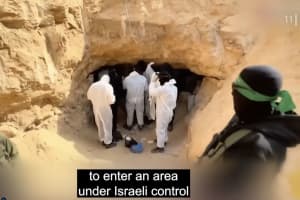Rosh Hashanah: The Bible’s second new year and a different kind of beginning

The Bible speaks of two beginnings of the year: in Nisan the sacred calendar begins, while in Tishri the civil and Jubilee years start. The Tishri new year is not merely a rabbinic tradition – it is rooted in the Bible itself, which commands that the fiftieth year, the year of liberty, must be proclaimed then. The prophet Ezekiel received his final vision “at the beginning of the year” (in Hebrew, Rosh Hashanah), and in the same season Jesus read from Isaiah in the synagogue: “to proclaim the year of the Lord’s favor.”
Nisan and Tishri – two beginnings of the year
Scripture presents two points of reference for the year. One is the first of Nisan, marking Israel’s deliverance from Egypt and the beginning of the festival cycle. The other is the month of Tishri, which the Bible sets as the beginning for sabbatical years and the Jubilee, for God commands that the Jubilee year must be consecrated on the Day of Atonement, the tenth of the seventh month (Leviticus 25:9–10).
Another biblical witness to this Tishri beginning of the year appears in the way the Torah describes the harvest festivals. Twice it speaks of the Feast of Ingathering “at the year’s end”:
“You shall keep the Feast of Harvest, of the firstfruits of your labor, of what you sow in the field. You shall keep the Feast of Ingathering at the end of the year, when you gather in from the field the fruit of your labor.” (Exodus 23:16)
“You shall observe the Feast of Weeks [Shavuot], the firstfruits of wheat harvest, and the Feast of Ingathering at the year’s end.” (Exodus 34:22)
Another biblical reference comes from Moses’ command concerning the public reading of the Law:
“At the end of every seven years, at the appointed time in the year of release, at the Feast of Tabernacles…” (Deuteronomy 31:10).
Since the Feast of Tabernacles (Sukkot) immediately follows Rosh Hashanah and the Day of Atonement, all within the month of Tishri, this command also shows that Tishri functions as a divinely appointed turning of the year—an appointed time of release and renewal.
These passages demonstrate that Scripture itself recognizes more than one kind of year-cycle. The agricultural year comes to its close in Tishri with the final ingathering of the produce, and it is on this basis that the sabbatical years and the Jubilee are also counted from Tishri. Alongside the Nisan-based sacred calendar, the Bible thus acknowledges a Tishri-based reckoning—different in nature, but equally a biblically grounded beginning of the year.
The clearest expression of this Tishri new year, however, appears in the book of Ezekiel. When the prophet introduces his final vision, he dates it with these words:
“In the twenty-fifth year of our captivity, at the beginning of the year, on the tenth day of the month…” (Ezekiel 40:1).
In Hebrew the phrase is בְּרֹאשׁ הַשָּׁנָה (b’Rosh Hashanah)—literally “at the head of the year.” This is the only place in the Bible where the term itself occurs, and significantly, Ezekiel uses it to describe a vision given at the Tishri turning point, on the Day of Atonement. Here we find the biblical root of the very expression by which the festival is known today: Rosh Hashanah.
Rosh HaShanah - The Feast of Trumpets
The Torah establishes the first day of the month Tishri as a unique memorial day:
“In the seventh month, on the first day of the month, you shall have a holy convocation. You shall do no customary work. For you it is a day of blowing the trumpets” (Numbers 29:1).
“In the seventh month, on the first day of the month, you shall have a sabbath-rest, a memorial of blowing of trumpets, a holy convocation” (Leviticus 23:24).
But what trumpet blast were the Israelites to remember as they wandered in the wilderness? The moment when God Himself descended on Mount Sinai:
“And it came to pass on the third day, in the morning, that there were thunderings and lightnings, and a thick cloud on the mountain; and the sound of the trumpet was very loud… Now Mount Sinai was completely in smoke, because the Lord descended upon it in fire.” (Exodus 19:18)
The memorial of trumpet blasts points back to that awesome encounter when the Lord came down to the Earth to enter covenant with His people.
The beginning of the Year of the Lord’s Favor
In Jewish tradition the Nitzavim Torah portion is always read on the last Sabbath before Rosh Hashanah. The prophetic portion attached to it comes from Isaiah 61.
For centuries this chapter has been read on the Sabbath leading directly into the first day of Tishri - Rosh HaShanah. This explains why, in the synagogue of Nazareth, Jesus was given precisely this scroll to read:
“The Spirit of the Lord is upon Me, because He has anointed Me to preach the gospel to the poor… to proclaim the acceptable year of the Lord.”
(Luke 4:18–19, citing Isaiah 61)
This was not a random reading but a programmatic act: at the threshold of the biblical new year, Jesus proclaimed the true year of release, the beginning of God’s redemptive favor.
The new beginning of the year in Tishri is not only a matter of calculation but of encounter: at Sinai the Lord descended in fire, and in Nazareth the Messiah proclaimed the year of the Lord’s favor. In these days, as Israel groans under division within and threats without, the call to covenant and redemption resounds more urgently than ever. May this year be a true Jubilee – a holy season of release and forgiveness, freedom for the captives, deliverance for those enslaved by sin, and the dawning light of the Messianic age. May this indeed be the Lord’s acceptable year – the year of redemption, of mercy, and of new beginnings.
"The Spirit of the Lord is upon Me,
Because He has anointed Me
To preach the gospel to the poor;
He has sent Me to heal the brokenhearted,
To proclaim liberty to the captives
And recovery of sight to the blind,
To set at liberty those who are oppressed;
To proclaim the acceptable year of the Lord."
(Luke 4:18–19)
Is All Israel News’ faith-based reporting important to you? Be part of it—help us continue by becoming a $5/month supporting partner.

Yehuda is a former teacher in Israel's first accredited Messianic school, based in Jerusalem, holding academic degrees in mathematics, physics, and philosophy. He joined the ALL ISRAEL NEWS staff in August 2023.
You might also like to read this:

















